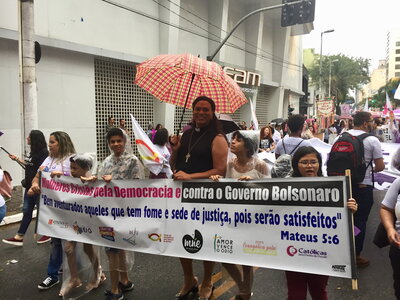by Joe Coyle
Joe Coyle is a Ph.D. candidate in the Department of Anthropology who has recently returned from Brazil after the COVID-19 pandemic interrupted his dissertation fieldwork. Joe's research focuses on "igrejas inclusivas" or LGBTQ-inclusive evangelical churches in Brazil.

As Brazil began reporting its first local transmissions of coronavirus in early March of 2020, a neo-Pentecostal church in Porto Alegre entered national headlines for a pamphlet it published that claimed the application of anointed oil could immunize a believer from COVID-19. In the days and weeks that followed, Brazil’s far-right president Jair Bolsonaro minimized the threat of COVID-19, calling it a “little flu” (gripezinha) and evangelical leaders wasted no time in weighing in on the pandemic through a variety of evangelical media including online church services, TV channels, and social media sites. Edir Macedo, the leader of Brazil’s homegrown Universal Church of the Kingdom of God and owner of Record TV, called COVID-19 “Satan’s work.” Vlademiro Santiago, the head of the Universal Church of God’s Power called it “a divine punishment.” And Silas Malafaia, an Assembly of God pastor and religious entrepreneur with 1.4 million Twitter followers, claimed quarantine was a “farce” that blocked churches from providing “essential” services that attended to people’s well-being.
On March 26, Jair Bolsonaro decreed that churches constituted essential services. Soon after, he joined other evangelical leaders in calling for a national fast against coronavirus. In a widely distributed video, he called upon “Christ’s army” to participate in the “biggest fasting and prayer campaign ever seen in the country.” Other evangelical leaders, like the above mentioned Valdemiro Santiago and Edir Macedo, appeared in the video alongside leaders from Brazil’s Evangelical Caucus.
As Brazil’s death toll rises with several hundred deaths a day and hospitals are overrun across the country, Bolsonaro continues to downgrade the seriousness of the pandemic. “What do you want me to do? I’m Messiah but I don’t make miracles,” he responded to a reporter on April 28th in reference to his full name (Jair Messias Bolsonaro). If Bolsonaro has been callous in his rhetoric about COVID-19, he has been bellicose during pro-government demonstrations that have gathered many in the streets since COVID-19’s emergence in Brazil. On April 19th, Bolosnaro gathered with pro-military intervention demonstrators in Brasília shouting “Now it’s the people in power…Enough with the old politics. Now its Brazil above everything and God above everyone.”
Bolsonaro’s anti-democratic discourse and practice, his alliance with powerful conservative evangelical leaders, and his disregard for civilian safety during the COVID-19 pandemic continues to shake Brazil’s uncertain democracy. While recent Datafolha research shows that lay evangelicals are more supportive of the Bolsonaro government during the COVID-19 pandemic in comparison with non-evangelical voters, most of these individuals have stayed at home rather than attend church services. As churches that have shuttered and taken most of their services online begin to re-open, it will be important to track how this population looks toward or away from Bolsonaro as Brazilian citizenship continues to re-constellate in these uncertain times.